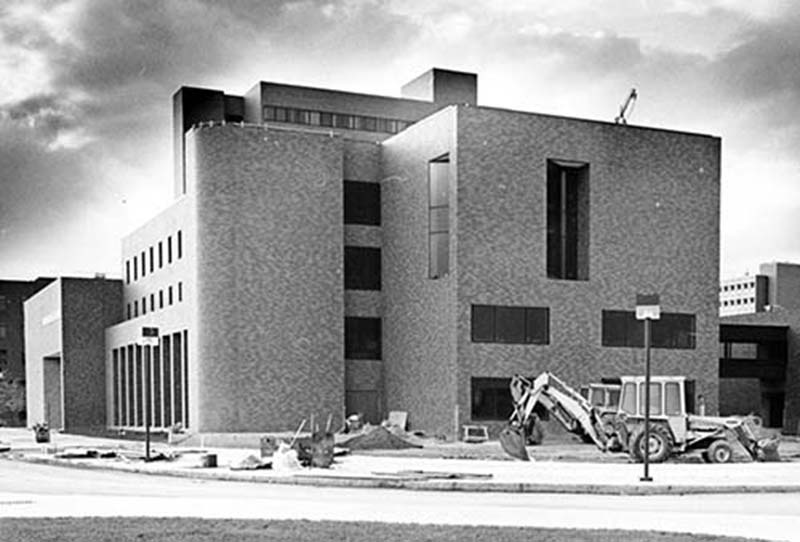Frank B. Baird Hall

Location: North
Historical Note:
"Baird Hall is the primary home of the Music Department. It hosts the Department Office, the Office of the Chairman, the Office of Student Programs, and the vast majority of faculty, staff, and TA offices, as well as 64 practice rooms, ensemble rehearsal rooms, classrooms, Faculty and Student Lounges, and the Music Library. It is also the home of Baird Recital Hall, one of two primary venues for Music Department-sponsored concerts" (from "Baird Hall" on the Music Department website).
Baird Hall and adjoining Slee Hall were conceived as the "Music Complex" on the University's North Campus.
Namesake:
Officially named for Frank Baird, the patriarch of the Baird family, Baird Hall is really a reminder of the contributions Baird and his two sons gave to UB for over 65 years.
Frank Burkett Baird (1852-1939) was an early supporter of the University of Buffalo and was a member of the University Council from 1920-1939. He received the University Chancellor's Medal in 1927 in recognition of this support. He was a successful industrialist who built the Tonawanda Iron Co., developed the Hanna Furnace Co., and organized the Buffalo Union Furnace Co. Frank B. Baird was also deeply involved in civic activities in the Buffalo community, serving as president of the Chamber of Commerce and the Buffalo Club, serving on the board of directors for the Pan American Exposition in 1901, and playing a substantial role in the construction of the Peace Bridge that connects the city of Buffalo with Ontario, Canada. The original Baird Hall on the South Campus was named in honor of Frank B. Baird.
Cameron Baird (1905-1960), the elder son of Frank B. Baird and Flora M. Cameron Baird (d. 1960), was known for his dedication to the Buffalo music community. His musical studies included piano from an early age, viola, composition with Paul Hindemith and Bernhard Heiden, and conducting with Bruno Walter and Felix Weingartner. He was instrumental in establishing the Buffalo Philharmonic Orchestra Society along with Frederick C. Slee and Samuel P. Capen and performed as a violist with the Orchestra for several seasons. Baird founded the Buffalo Oratorio Chorus in 1930, and conducted the Buffalo Schola Cantorum for ten years. In 1951-1952 Cameron Baird founded the Music Department at the University at Buffalo and became the department's first chairman. In addition to his musical interests, Cameron Baird was also a successful businessman, having founded and operated the Buffalo Pipe and Foundry Co. with his younger brother William C. Baird.
William C. Baird (1908-1987), younger son of Frank B. Baird, was a well known and respected business man and philanthropist. In 1930 he joined the family business, the Buffalo Pipe and Foundry, later becoming the first president and then chairman of the board. For most of his life, Baird worked at making a better community for Buffalo and its environs. Continuing his father's association with the Peace Bridge, he served from 1939-1960 as bridge commission chairman. A true philanthropist, Baird helped organize the Butler Mitchell Boys Club and there is a Clubhouse named after him today. He was awarded the Walter P. Cooke Award in 1967, awarded the University Chancellor's Medal in 1978, granted an honorary doctorate of humane letters in 1984, served on the University Council for almost forty years, received the SUNY Distinguished Citizen Award, and was elected to the UB Athletic Hall of Fame in 1970. Among William C. Baird's many contributions to the University at Buffalo, two are evident in campus sites: Baird Point and the Center for Tomorrow, dedicated to William C. Baird.
History/Chronology:
- 1979 - (November 9) Cornerstone ceremony
- 1981 -- (November) Completion
- 1982 -- (November 22) Open House and Inaugural Faculty Recital (in conjunction with the opening of Slee Hall)
- 1982 -- The former Baird Hall on the South Campus is renamed Cornelia H. Allen Hall
Original Architect: Ulrich Franzen & Associates from NYC
Original Contractors: J. Migliore Construction Company of Tonawanda
Construction Cost: $6,132,000
Original Size: 85,580 gross sq. ft.